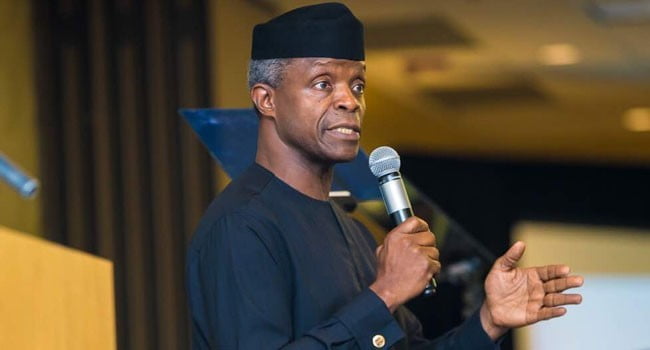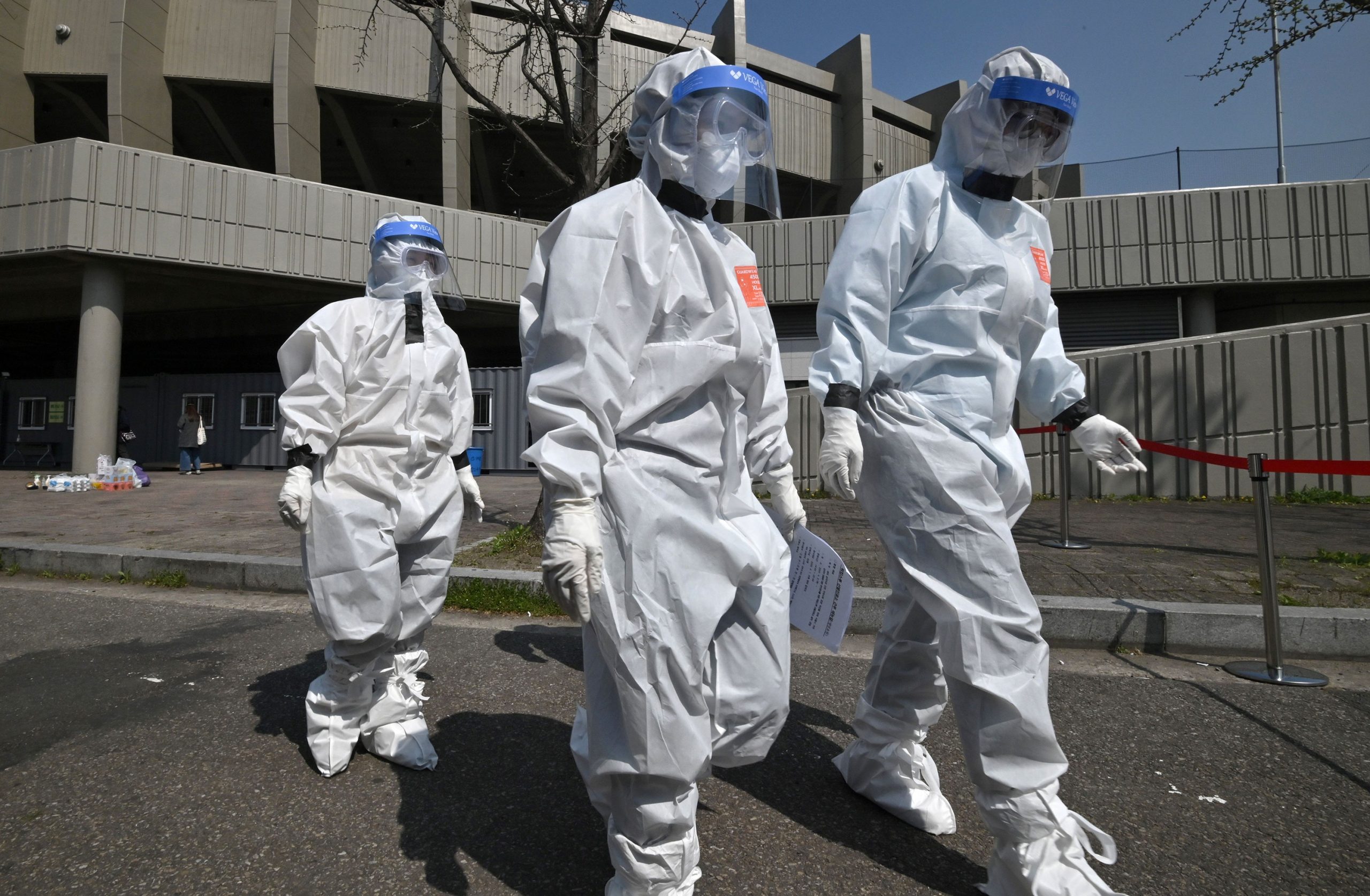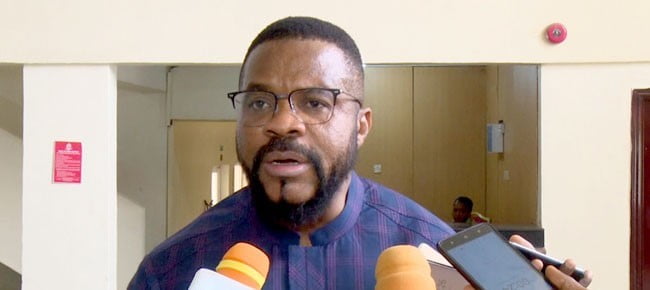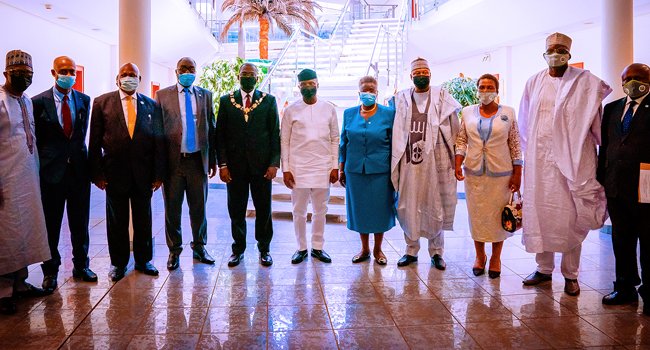Fighting Corruption In Nigeria Will Become More Difficult, Says Osinbajo
Speaking on Tuesday at the 20th-anniversary regional webinar organised by the Independent Corrupt Practices and other offences Commission (ICPC), Professor OSinbajo said the nation must at all times prioritize the fight against graft and all other corrupt practices.
In his speech titled, “Combating corruption and illicit financial flows: New measures and strategies.” and made available to journalists by his spokesperson, Laolu Akande, the Vice President warned that aside from the difficulties, many people will also get frustrated for standing against corruption.
“The fight against corruption is nuanced and hydra-headed, it is not going to get easier by the day, as a matter of fact, it will get more difficult by the day and many will become discouraged in standing up against corruption.
“But it is our duty both as individuals and institutions especially in developing countries where corruption has such a devastating effect, to ensure that we prioritize the fight against corruption and continually device new ways and new approaches even as the hydra-headed problem itself continue
to manifest in different ways,” the Vice President stated.
He said secret corporate ownership and the whole issue of beneficial ownership is one major issue which the international community must work together to solve. Adding that for the developing world and especially in Africa, breaking the wall of secret corporate ownership is crucial because secrecy around corporate ownership is implicated in our underdevelopment.
BELOW IS THE FULL TEXT OF THE VICE PRESIDENT’S ADDRESS:
ADDRESS BY HIS EXCELLENCY, PROF. YEMI OSINBAJO SAN, VICE PRESIDENT, FEDERAL REPUBLIC OF NIGERIA AT THE 20TH ANNIVERSARY AFRICA REGIONAL WEBINAR OF THE ICPC THEMED COMBATING CORRUPTION AND ILLICIT FINANCIAL FLOWS: NEW MEASURES AND STRATEGIES
Let me say first, how very pleased I am to be a part of this celebration, joining the ICPC Board, Management and staff to celebrate the 20th anniversary of this important national and regional institution.
20 years have passed since we passed the Corrupt Practices and Other Related Offences Act and set up the Independent Corrupt Practices and Other Related Offences Commission as the first anti-corruption agency, in Nigeria and possibly in the region. This was three years before the UN Convention Against Corruption (UNCAC) was adopted, and five years before UNCAC came into effect. So, in many ways, you are pioneers of the anti-corruption struggle in our region and indeed in very many parts of the world.
The three-fold mandate of ICPC remains relevant today as it was 20 years ago namely:
*enforcement of laws against corruption,
*prevention of acts of corruption andenlightenment against corruption.
Our government has supported the fulfillment of this statutory mandate first by demonstrating the political will and support for anti-corruption measures from the Number one citizen of Nigeria, the President himself. We have seen that demonstrable political will and that political will has afforded all our anti-corruption agencies the latitude to do their work without interference.
Secondly, by taking measures that reinforce the prevention mandate of ICPC: For example the enforcement of the TSA policy; strict application of BVN which is the biometric information required for opening of bank accounts and fro maintaining bank accounts; strengthening of the e-government system comprising GIFMIS and IPPIS which are electronic platforms for managing human resource material in the public service and also for budgeting purposes; the launching late last year of the open treasury portal through which payments for works, goods, and services may be monitored globally, and by encouraging the use of the Freedom of Information Act by civil society to elicit information from government agencies.
The public education and citizen engagement mandate is supported by the government’s encouragement of a vibrant role for citizens, the media and civil society in the anti-corruption crusade.
Besides, both the ICPC, &
the EFCC have held several public participation campaigns to encourage civic participation in the anti-corruption struggle.
The theme of this webinar COMBATING CORRUPTION AND ILLICIT FINANCIAL FLOWS: NEW MEASURES AND STRATEGIES, I think, again just reminds us that corruption remains a scourge to our development aspirations and has become for us in the developing world, an existential issue.
Over the years, massive public resources and assets have been directly stolen, diverted, deliberately misapplied to gratify corrupt tendencies, stashed in foreign jurisdictions or mired in and susceptible to pilferage by the inequitable and unjust international economic system that continues to undermine the social and economic development aspirations of poor countries especially from Africa.
Without effectively combating corruption and IFFs and promoting international cooperation for asset recovery and asset return, Africa cannot achieve the Sustainable Development Goals. Goal 16 of the SDGs is devoted to corruption. Specifically, Target 16.4 commits that: “By 2030, significantly reduce illicit financial flows and arms flows, strengthen the recovery and return of stolen assets and combat all forms of organized crime.”
Both the UN General Assembly and the African Union have committed to measures to fight corruption and stem IFFs. UNCAC and the African Union Convention on Preventing and Combating Corruption have remained the touchstone of the fight against corruption and IFFs. Other initiatives include the Addis Ababa Action Agenda and the AU Assembly Special Declaration on Illicit Financial Flows. More recently, the UN General Assembly Resolution 74/206 of 19 December 2019 commits to the promotion of international cooperation to combat Illicit Financial Flows (IFFs) and strengthen good practices on asset return to foster sustainable development.
Nigeria has demonstrated leadership in the advocacy
for collective efforts to stem IFFs from Africa and has also been at the forefront of advocacy for stemming IFF and promoting international cooperation for asset recovery and asset return at the UN General Assembly. As the AU Champion on Anti-Corruption, President Buhari in his report to the ASSEMBLY OF THE UNION, Thirty-Second Ordinary Session and at the 71st Session of the UN General Assembly, affirmed Nigeria’s commitment to continue to “advocate for the facilitation of recovery of illicit financial assets.”
Towards this end, Nigeria proposed the Draft Common African Position on Asset Return (CAPAR) at the 36th Ordinary Session of the Executive Council of the AU in February 2020 at which the CAPAR was adopted. I am aware that Prof. Bolaji Owasanoye, Chairman ICPC was a member of the Working Group that produced the CAPAR.
One more matter of concern that the international community must work together to solve is the matter of secret corporate ownership and the whole issue of beneficial ownership.
For us in the developing world and especially in Africa, breaking the wall of secret corporate ownership is crucial because secrecy around corporate ownership is implicated in our underdevelopment. Although anonymous companies
are not always illegal, nevertheless secrecy provides a convenient cover for criminality and corruption.
Our experience in Nigeria as in other developing countries is that anonymous corporate ownership covers a multitude of sins including conflict of interests, corruption, tax evasion, money laundering, and even terrorism financing.
At the May 2016 London Anti-Corruption Summit, President Muhammadu Buhari made a commitment to establish a public register of the beneficial owners of all companies operating in Nigeria. Following that commitment, Nigeria joined the Open Government Partnership (OGP) in December 2016 and subsequently submitted a National Action Plan prioritizing the establishment of an all-encompassing and publicly accessible register.
Nigeria is in the process of amending its corporate law to implement these measures and mandate the disclosure of beneficial interest in
a company’s shares and prescribe punitive measures for failure to disclose.
We are mindful of the challenges dogging advocacy for stemming IFFs, promotion of asset recovery and return to victim countries, and enforcement of beneficial ownership disclosure not just in our country but globally.
We note for example, the resistance of some countries to stemming illicit financial flows, curbing tax evasion, support asset return to countries of origin and we note that laws passed in some developed countries to mandate beneficial ownership disclosure do not set examples for best practice as they do not cover territories and dependencies where most of the stolen assets from developed countries end up.
I sincerely hope this regional webinar will advance the advocacy further and bring up innovative solutions to these internationally shared concerns.
Let me conclude by saying there is no magic bullet to ending corruption, stemming IFFs or promoting asset recovery and return. We simply must work hard at it and be determined to succeed. We must make corruption expensive for those who engage in it and send the unequivocal message that corruption simply does not pay.
We must also make all members of the international community see the benefit of shared prosperity and inclusive growth and development. It is the unenviable but noble task of ICPC and other anti-corruption agencies to make corruption unattractive to its disciples and facilitate new approaches to stemming IFFS and
promoting asset recovery and return.
As you ruminate on the key issues to dominate the UN General Assembly Special Session on Corruption in 2021, I urge you to come up with concrete proposals for Nigeria to take to the UN and also for all of our colleagues in the region, to take to the United Nations in order to begin to positively shape policy in a way and manner that best promotes the interest of our country and region.
Domestically we must also be prepared to change, to some extent, our tactics in the fight against corruption. Listening to Edward Kallon (The UN Resident Coordinator in Nigeria who spoke earlier), I am convinced that there are many practical steps that can be taken.
We must democratize the fight against corruption. Many of our citizens are interested in the fight against grand corruption. Grand corruption as you know cripples the economy. But they also want to see action in
what would be regarded as petty corruption – in their interfaces with government officials either in the search for certifications, approvals of any kind, licenses, and all of that. Many want to see that corruption at that level is tackled effectively. And I think that we must begin to look at innovative ways of doing so.
Secondly, we must protect, even more, whistle-blowers – persons who come forward with information against corruption. We must protect those who are ready to fight against corruption and who are prepared to do so without necessarily disclosing their identities and even those who are ready to disclose their identities.
The thing that we must take note of is that corruption fights back. And it is fighting back and it has the resources to do so. In recent times, one of the chief ways that we are seeing more frequently is the use of unscrupulous individuals who are paid to use social media platforms to make outrageous allegations against persons perceived to be fighting corruption. The technique is not new, the idea is to tie everybody with the same tar so that you cannot recognize the truly corrupt or the truly corrupt activity, and the genuine whistle-blowing is discredited as a result. And because our court system is slow, they count on the possibility that these victims may not pursue litigation or prosecution: you must devise a new legal strategy to ensure that this dirty trick not only fail but are penalized.
The fight against corruption is nuanced and hydra-headed, it is not going to get easier by the day, as a matter of fact, it will get more difficult by the day and many will become discouraged in standing up against corruption. But it is our duty both as individuals and
institutions especially in developing countries where corruption has such a devastating effect, to ensure that we prioritize the fight against corruption and continually device new ways and new approaches even as the hydra-headed problem itself continue to manifest in different ways.
I am happy to note that the ICPC has creditably discharged itself of its mandate in the past twenty years. This is no doubt due to the solid leadership it has enjoyed from inception through the first Board led by the late Hon Justice Mustapha Akanbi, then Hon. Justice Olayinka Ayoola, and then Mr. Expo Nta and the current 4th Board led by Prof. Bolaji Owasanoye, and the tireless effort of its management and staff.
I wish you all a happy 20th anniversary celebration. Government looks forward to the recommendations of your conference towards improving the fight against and ultimately defeating corruption.
Thank you very much God bless you all
Laolu Akande
Senior Special Assistant to the President on Media & Publicity
Office of the Vice President
14th July 2020



